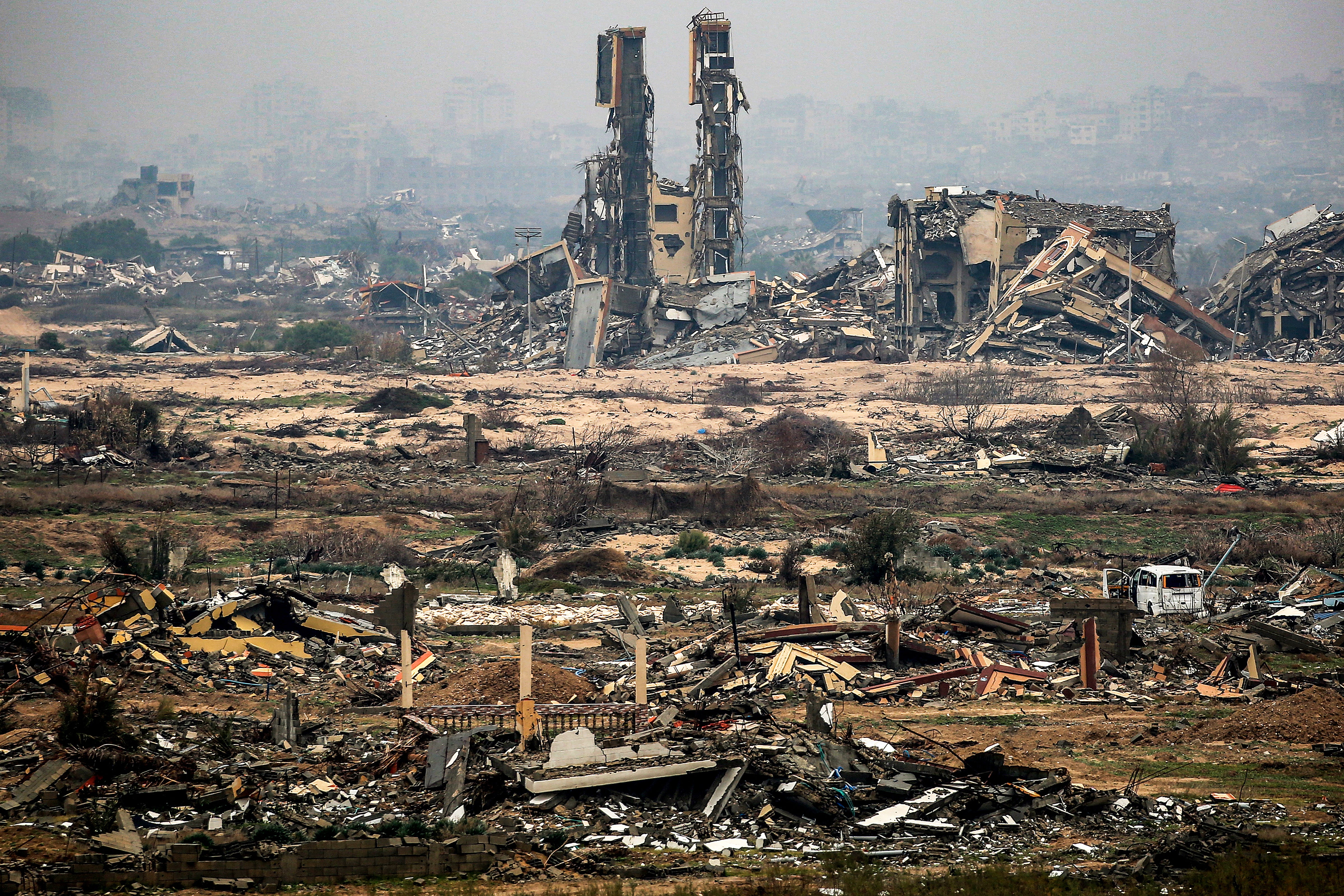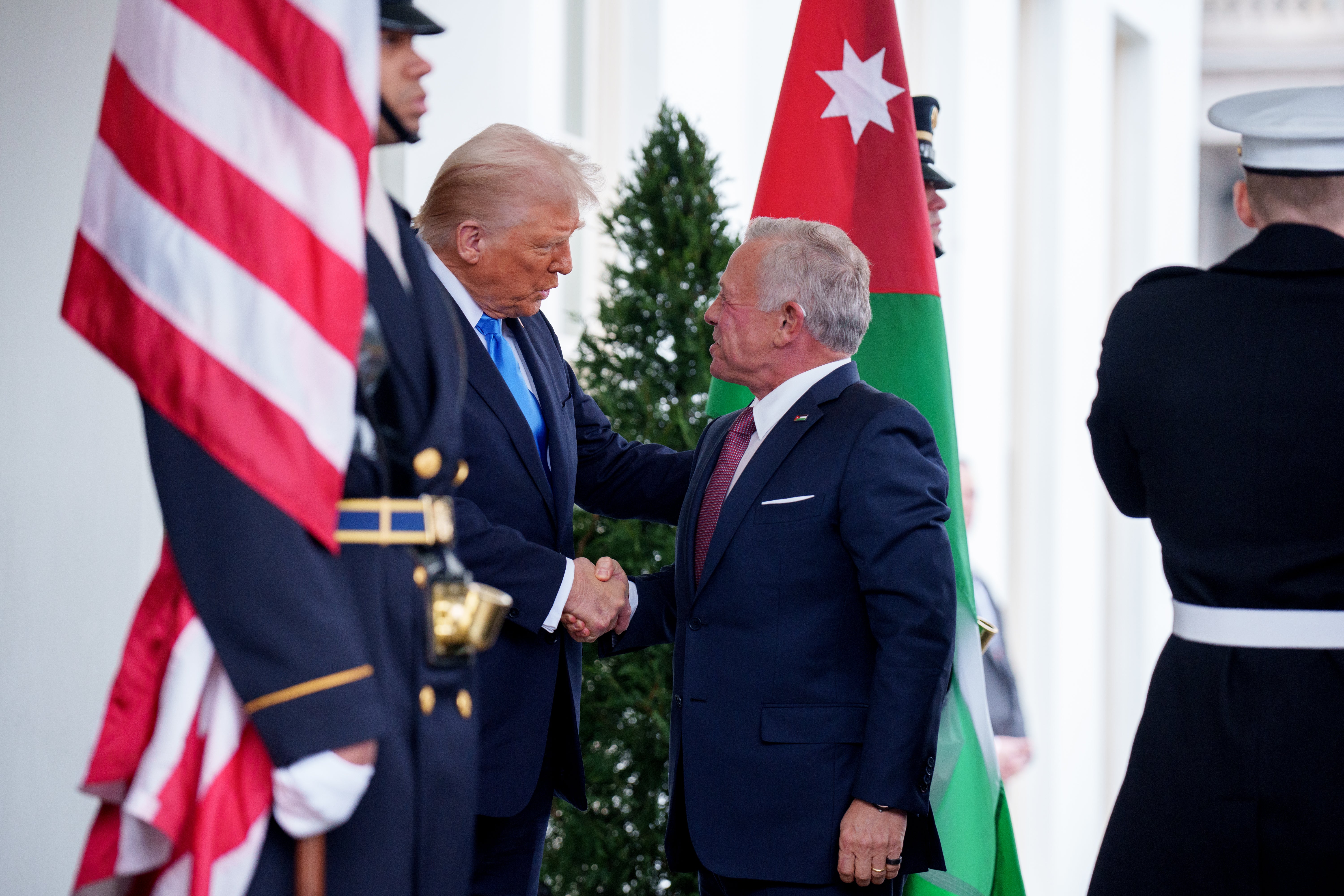From Ukraine’s minerals to the Gaza Riviera – why Trump’s foreign policy is all about money
Whether it is real estate or precious resources, Donald Trump is treating global geopolitics like a monopoly board. And that, says Alex Hannaford, is why no one should rely on his loyalty, not even Benjamin Netanyahu or Vladimir Putin

Donald Trump would like the world to know he’s a man about big deals and big ideas.
Last week he announced he was negotiating an end to the war between Russia and Ukraine – but without involving Ukraine in the deliberations. He then labelled the Ukrainian president Volodymyr Zelensky a “dictator” for good measure.
This week he hosted a bromance press conference with President Emmanuel Macron of France. Hours later, the US sided with Russia, China and North Korea in the UN.
It has been as unpredictable as ever, but one thing has remained constant – and that is Trump’s desire to get US hands on Ukraine’s very valuable mineral resources as a way to recoup “hundreds of billions of dollars of American taxpayers’ money” spent supporting Ukraine in its war with Russia.
Ukraine wants any such deal to come with some kind of security guarantees from America. So far, none have been promised.
A generous view of this approach would be that Trump was forcing European allies to rethink their involvement in the conflict and commit to Ukraine’s sovereignty and self-determination. A less generous interpretation was that he was ill-informed at best and is being dangerously manipulated at worst, especially by Vladimir Putin. President Zelensky hit back, accusing Trump of succumbing to disinformation. “This is not a serious conversation,” he said. “I can’t sell our country.”
It certainly wasn’t the only time in recent weeks that Trump had thrown a wild suggestion into the mix, causing worldwide astonishment. Only recently he shared his vision for a bombed-out Gaza to be turned into a beautiful Middle Eastern riviera.
As he spoke of his dream for the war zone to be transformed into prime real estate, even his chief of staff, Susie Wiles, became momentarily boggle-eyed. But a few days later, many of those surrounding the president were nodding along with the plans. And for his inner circle, it wasn’t the first time they had heard them either.
A year ago, Donald Trump’s son-in-law Jared Kushner, sat on stage in a button-down shirt and sweater, for a conversation with Tarek Masoud, a politics professor at Harvard University.
“Gaza’s waterfront property,” Kushner told Masoud at the college’s Middle East Initiative, “could be very valuable. … it’s a bit of an unfortunate situation there”, he added, “but I think from Israel’s perspective I would do my best to move the people out and then clean it up, but I don’t think that Israel has stated that they don’t want the people to move back there afterwards.”
Speaking to CBS News a year later, Masoud attempted to clarify that he and Kushner had been talking specifically about an impending Israeli assault and what could be done with Palestinians who were sheltering from the bombing. One proposal, Masoud, said, was that they could go to Egypt while Israel was mounting its campaign, but the Egyptians had refused and so Kushner was proposing another possibility – creating a safe zone in the Negev desert. But nobody, he said, was suggesting that Palestinians shouldn’t return to Gaza afterwards.
By this point, though, it didn’t matter. Twelve months later, Kushner’s suggestion had resurfaced and was now going viral. And for good reason. His father-in-law had just declared he was “committed to buying and owning Gaza”; that he envisaged a “riviera of the Middle East” there with “good-quality housing” and a “beautiful town”.

It seemed weirdly identical to Kushner’s vision – save for one thing: Trump was intimating the Palestinians would have no right of return. The US was, he said, “committed to owning it, taking it, and making sure that Hamas doesn’t move back”. The Palestinians who would be displaced would “have much better housing”, he told Fox News. “I’m talking about building a permanent place for them.”
New York Times columnist Thomas Friedman wrote that Trump’s proposal was “the single most idiotic and dangerous Middle East ‘peace’ initiative ever put out by an American president”. Friedman added that he wasn't sure what was more frightening, “Trump’s Gaza proposal, or the speed with which his aides and cabinet members nodded their approval of the idea like a collection of bobblehead dolls.”
Like many of Trump’s supposed plans, the president’s vision for Gaza received a less-than-warm welcome from neighbouring nations in the Middle East. The Saudi government reaffirmed its unwavering support for a Palestinian state, and in a rare phone call, Saudi crown prince Mohammed bin Salman and King Abdullah II of Jordan discussed their firm backing for Palestinian rights.
Five months earlier, Jordan’s foreign minister had warned that any Israeli attempt to force Palestinians into Jordan would breach the peace treaty and be seen as an “act of war”. Egypt informed US officials that the plans threatened the 1979 peace treaty with Israel.
Just as Zelensky hit back at Trump’s grasp on reality this week, an editorial in the Palestine Chronicle by its editor Ramzy Baroud said Trump’s comments expressed “more than callousness – they also reflect ignorance”. Baroud said the US had blindly supported the “Israeli genocide in Gaza” and that “no rational thinker, in the Middle East or beyond, would actually imagine a scenario in which Palestinians are leaving en masse due to Trump’s threats”.

Even Masoud, who interviewed Kushner a year ago, seemed shocked by Trump’s plan. The president’s statements, he said, now put his interview with Kushner “in a very different light … I have to say I was surprised to hear President Trump float this idea of American ownership of Gaza”, he told CBS News.
Unusual for some, maybe. Others saw a much more calculated plan. As Middle East Eye reported, not only had Kushner been discussing plans for Gaza for at least a year, but “he has the funds and political connections to make it a reality”.
After Trump’s first term, during which Kushner held a position in the administration as a senior adviser, he launched Affinity Partners, a private equity fund with an ambition to develop luxury resorts abroad. With a $2bn (£1.5bn) investment from Saudi Arabia’s sovereign wealth fund, together with $1.5bn from the UAE and Qatar, Affinity announced it was backing a $1.4bn resort on Albania’s Sazan Island, as well as turning a former Yugoslavian military base in the Serbian capital Belgrade into an upscale hotel.
According to a report in Middle East Eye, Joseph Pelzman, an economics professor at George Washington University, said that Kushner “wants to put money in” [to Gaza’s redevelopment] and that his investors were “salivating to get in”.

Israel can’t simply hand over Gaza to the US. The International Court of Justice, known as the World Court, which arbitrates disputes between nations, has declared Gaza occupied territory – illegal under international law. For the US to take control of Gaza, in theory, it would need Palestine’s consent.
Marwa Maziad, a professor of Israel Studies at the Gildenhorn Institute at the University of Maryland, told The Independent that while she agrees that Arab nations – primarily Egypt, Saudi Arabia, and Jordan – “understand the long-term threats from even entertaining any of this”, she also believes that these Arab states are playing the waiting game. They’re taking time to put forward another plan – one that involves the Palestinians.
“They know Trump now covets this piece of land. He loves it. It’s not like [they’re] going to pull it from him and say ‘no, no, it’s ours’. [But they understand that] his interests are in development and moneymaking. Yes, you will have a Trump Tower. But not minus the Palestinian state. Not minus the Palestinians. Not minus all of these things that are in Israel’s own interests.”
Maziad believes that we’ll soon see a vision emerge for Gaza – from these other Middle Eastern states – of what development and reconstruction there could look like. “This will mean that Egypt will eventually have to be present on the ground,” she says. “[They’ll have to provide] civilian staff, but also potentially security, policing, military, to secure everything.”

Maziad also believes that if Israeli prime minister Benjamin Netanyahu pushes back on any new plan that involves ensuring a home for Palestinians, that’s when Trump could turn against him.
“If Netanyahu is an impediment to actual peace and stability, [Trump] could throw him under the bus.” This alternative vision for Gaza may have materialised sooner than she anticipated. Last week, Middle East Eye reported that Egypt and Jordan had successfully dissuaded Trump from backing the forced displacement of Palestinians from Gaza, and that the US was now starting to back a post-war plan put forward by Egypt.
Suggesting an alternative plan to Trump’s grand imaginings is on Zelensky’s mind too. Trump’s proposal that the US should plunder Ukraine’s mineral resources as repayment for its support in the war against Russia perhaps underscores his true priorities: that far from being a champion of democratic ideals, he has an unwavering devotion to cold, hard cash – in short, money trumps everything else.
In a stern ultimatum, Trump’s national security adviser Mike Waltz outlined what the Ukrainian leader needed to do to get back into Trump’s good books – it included “coming back to the table to negotiate a deal over Kyiv’s rich mineral resources”. Zelenksy didn’t budge on the first draft deal proposal of the US taking ownership of 50 per cent of Ukraine’s critical minerals without any guarantees. Less than 24 hours after the men clashed so publicly, the Trump administration reportedly gave Ukraine an “improved” draft.
Speaking on Sunday, on the eve of the third anniversary of the start of the war, Zelensky reiterated he was not willing to sign a minerals deal worth $500bn – pointing out that the money far outweighs the amount of military assistance the US has provided.
But just a couple of days later, his deputy prime minister, Olga Stefanishyna, posted on X (Twitter) that a deal was close. “Negotiations have been very constructive, with nearly all key details finalised,” she wrote.
At the White House alongside Macron yesterday, Trump agreed that he expected to be meeting with Zelensky to sign the deal shortly. “In fact he may come in this week or next week to sign the agreement,” Trump told reporters in the Oval Office. “They’re very close to a final deal. It’ll be a deal with rare earths and various other things. And he would like to come, as I understand it, here to sign it. And that would be great with me.”
The question remains: can Zelensky navigate Trump’s instinct to follow the money and use his voice to drown out the Putin noise? Almost three years since the war started, will it be the art of the alternative deal that will end it?





Join our commenting forum
Join thought-provoking conversations, follow other Independent readers and see their replies
Comments